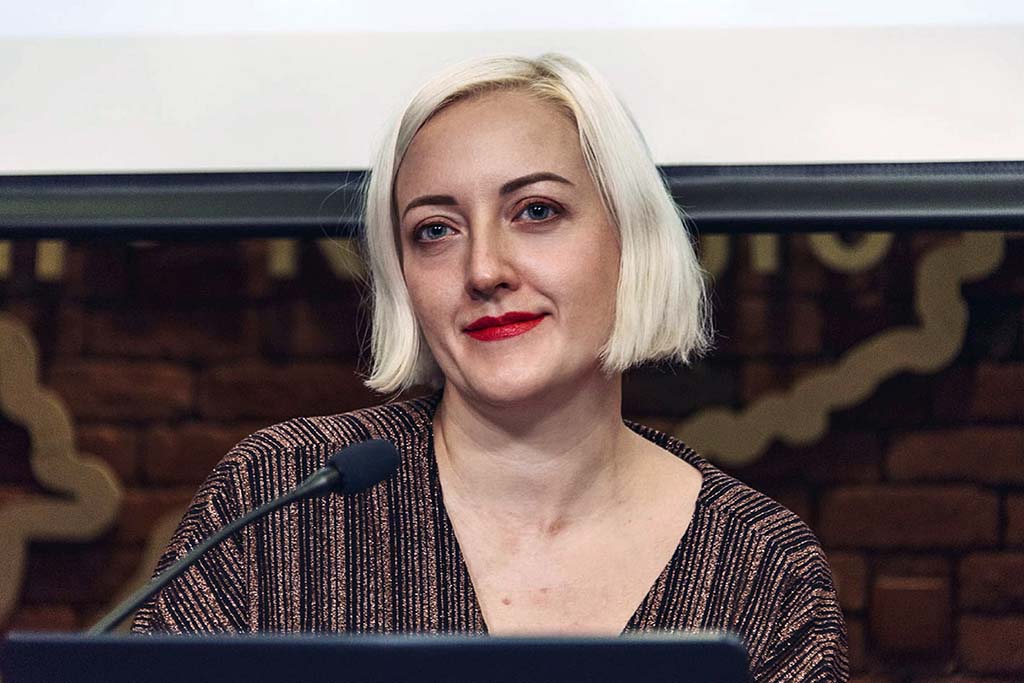The peace activist: “Our lives will never be as before”
“It is extremely important to support activists in Ukraine because they are in a terrible situation,” says Ukrainian peace activist Nina Potarska who has received funding from Kvinna till Kvinna’s emergency fund.

Cars, minibuses, food, medicine, bomb shelters; the list of what’s acutely needed in Ukraine is long. Women human rights defender Nina Potarska is torn up inside—she is glad she is safe with her family in Poland, at the same time she wants to return to Ukraine to help her colleagues. Because there is much work to do.
“I have this feeling that I want to go back to Ukraine, but my colleagues beg me to stay outside, so that I can speak with others and work with fundraising and manage humanitarian help. I understand that my work is important too, but mentally, my soul wants me to be together with them in Ukraine,” she explains.
Nina Potarska is the national coordinator for WILPF in Ukraine. Before the war broke out, she was engaged in reporting processes, assessments and research connected to women’s rights.
“Now, we have changed our focus and I’m doing what my group and my partner networks ask me to help with.”
“I am an additional brain”
The funding from Kvinna till Kvinna helps Nina to set up her personal life and her work life in a totally new setting, in Krakow, Poland. She is in constant contact with colleagues and fellow peace activists and women human rights defenders in Ukraina, because the situation changes every day.
“Sometimes they call me just to help them to think—I sometimes feel like an ‘additional brain’, outside Ukraine. I help them calculate the risks and make decisions. Sometimes it’s about making very simple decisions, but when a person is under such huge stress, even that can be difficult.”
What are the biggest needs among civilian women in Ukraine?
“Everybody in Ukraine is on the level of basic needs. It’s not even about psychological support or anything like that; they need safety, food, medicine. They need safe and quite places without bombing, shelling, and noise,” says Nina.
As a peace activist, what are your thoughts on a world that is taking up arms and where militarisation in and around Europe is increasing?
“I have a lot of worries. In Krakow, I have met a lot of combatants and veterans. I think, after this, it will be very hard to talk about peace with Ukrainians, because so many show their hate now. There is so much stress, so many tears, so many losses. I don’t know how much time we will need to recover and heal our trauma,” she says and sighs.
From Nina’s perspective, to be able to talk about peace, you to have peace within. But when you are experiencing losses every day, friends, family members, colleagues, your home, properties, your country, your life—the normal reaction is to be frustrated. And to feel hatred.
“They have destroyed everything. Our lives will never be as before.”
Difficult to have a dialogue
To build peace, there needs to be dialogue, according to Nina. But right now, it feels hard to listen to the perspectives of the other side. WILPF does not have a branch in Russia, but Nina has friends and a network there. She is in touch with some of them.
“I understand their regrets about the situation. But sometimes in these dialogues I feel that they are asking for regrets from my side. But I feel nothing now. There is no easy way to solve this.”
Nina describes herself as an open person, always happy to discuss everything. But not right now.
”I just need time. I want to be together with my friends, my colleagues. I want to support them. I want to help them survive.”
Discrimination of refugees
Every day, when Nina wakes up, she immediately checks the messages on her phone. A very hard thing to do.
“I wake up every day with information that somebody has died. But I am also happy every day when I receive messages from my colleagues that they are okay, that they are alive. Just one word, ‘I’m alive’, makes me relieved.”
As a refugee, Nina has become very aware of the different situations for refugees around the world:
“I’m always thinking about my colleagues from Yemen, Afghanistan, and other countries. I’m very sad, because there is a lot of racism and discrimination. I understand now that because I’m white, I’m more welcome in Europe than my colleagues from Yemen, for example. It is important to talk about this”, Nina Potarska says.